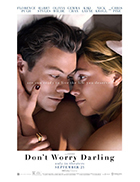Don't Worry Darling
|  Olivia Wilde’s Don’t Worry Darling takes place almost entirely in Victory, an idyllic-nightmare synth-world of mid-century modern architectural and stylistic perfection that is located somewhere in the vast California desert. The film’s best asset is this small company town’s production design, which is a marvel of brightly colored, cookie-cutter Frank Lloyd Wright-esque ranch houses arranged around impeccable green yards set against the arid, seemingly endless expanse of desert surrounding them. Victory is a literal oasis, but it is also a kind of prison, and its uncanny, surreal vibe resonates throughout the action. The protagonist is a young woman named Alice (Florence Pugh), who lives in Victory with her husband, Jack (Harry Styles), who works for the company that built the town. In fact, all of the men who live in Victory work for the company, whose headquarters are eerily located outside of town somewhere in the desert; each morning, they all get into their spotless, shiny 1950s-era cars and drive out across the dunes toward a distant mountain, where they engage in some kind of mysterious work about which they are not allowed to talk. Meanwhile the wives all stay at home, cleaning and buffing their immaculate homes, shopping at the company store for clothes and furniture, and engaging with each other in idle gossip while drinking around the pool. Their one rule is that they are not allowed to leave Victory, and they are discouraged from asking any real questions about much of anything (the title reflects the dismissive paternalistic attitude toward female inquiry, suggesting that there is no need to ask any questions because the men will take care of it and everything is fine, just fine, even when it isn’t). The film’s increasingly claustrophobic world is designed to feel like one of those idyllic Eisenhower-era watercolor magazine ads come to life—you know, the ones where impossibly smiling, impeccably dressed white families grill outside by a pool underneath a perfect summer sun—which means that it all feels unnatural, forced, wrong. And of course we know that something is wrong. We know that no one lives like this, even without the bizarre resort to a comic-book version of ’50s-era gender roles, so the questions constantly gurgling beneath the film’s surface are what? and why?. What is going on? Why do all the characters dress and live like this? Why is Victory so isolated? Why are the women not allowed to leave town? What do the men do when they leave each morning? And what secrets are being guarded by Frank (Chris Pine), the town’s designer and company CEO who all the men revere and who lords over Victory like some kind of benignly handsome dictator whose power is reflected in the fact that he never has to raise his voice. The answers to all those questions are out there, and there is no doubt that they will eventually be answered, and how you ultimately feel about Don’t Worry Darling will likely hinge on how you feel about the answers to those questions, which in retrospect are not terribly surprising or illuminating. The drag on Don’t Worry Darling is that so much of what makes it tick has driven previous, superior films, specifically Roman Polanski’s Rosemary’s Baby (1968) and Bryan Forbes’s The Stepford Wives (1975), both of which were based on novels by Ira Levin and took as their jumping-off point the manner in which husbands are willing to use their wives for their own advancement under the guise of creating a better life. In this horrific twist on the American Dream, comfort and security for men is a direct result of the exploitation (and, both literally and figuratively, destruction) of the women in their lives. Screenwriter Katie Silberman (working from a story by Carey Van Dyke and Shane Van Dyke) has no qualms about retreading familiar territory, and it largely works because director Olivia Wilde (who also plays Bunny, Alice’s neighbor and best friend) and cinematographer Matthew Libatique (who has shot most of Darren Aronofsky’s films) give the film’s surface such an intriguingly uncanny sheen. It is hard not to be drawn in by the designed beauty of Victory, even as you may feel repelled by its sterility. Prolific composer John Powell, who regularly collaborates with director Paul Greengrass, also helps to rachet up the tension and unease with his unconventional percussive score, which makes prominent use of breathy, strange human voices to give sonic embodiment to everything that feels wrong in the film. And, as she did in Ari Aster’s Midsommar (2019), Florence Pugh gives an outstanding performance as an innocent who slowly grows in awareness about the danger in which she is mired. The film performs some clever visual tricks to convey both her entrapment and slow awakening to her predicament, the best being her wiping away at a large interior glass window that slowly moves in on her before finally crushing her against a wall. Pugh’s Alice proves to be a fighter against the men around her, who comprise a sly cross-section of patriarchal privilege and control: Pine’s Frank, the smirking alpha male; Styles’s Jack, one of the many followers who puts up a good front, but it ultimately subservient to the alpha; and Timothy Simons’s Dr. Collins, who is all toothy charm as he actively dismisses each of Alice’s concerns (any woman who has had her health concerns pooh-poohed by a confident male doctor will feel the sting here). None of this is new, of course, but Don’t Worry Darling finds enough intriguing and compelling means of dramatizing and turning its domestic horrors inside out that it remains engaging right up until the final frames. Copyright © 2022 James Kendrick Thoughts? E-mail James Kendrick All images copyright © Warner Bros. |
Overall Rating: 

 (3)
(3)


